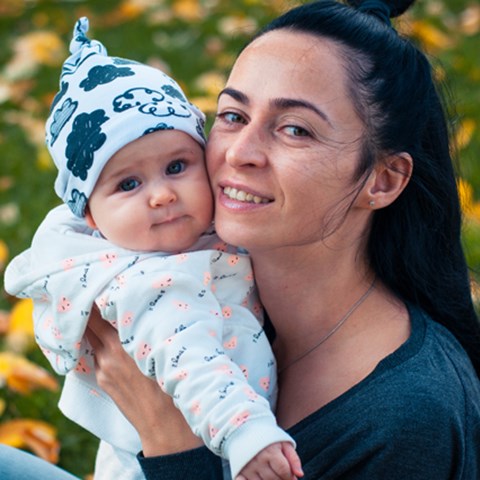A new report was published in the Human Reproduction Journal on 15 March 2023, entitled ‘I know it’s not normal but it’s normal to me, and that’s all that matters’: experiences of young adults conceived through egg donation, sperm donation, and surrogacy, written by V Jadva, C Jones, P Hall, S Imrie and S Golombok. We summarise its key points here.
Breaking new ground
Where previous studies on the thoughts and feelings of people involved with gamete donation and surrogacy have focused on parents and children, this new article contains insights direct from young adults, who felt either unconcerned or positive about the method of their conception.
Overall the report finds that young adults born through surrogacy and donor conception don’t feel negatively about their birth; this may be as a consequence of finding out about their conception at an early age. And although some of the young adults questioned wished to meet their donor, they weren’t necessarily actively looking to do so.
Who did the authors speak to?
The article examines the experiences of young adults who were conceived through egg donation, sperm donation, and surrogacy. The authors conducted interviews with 35 participants between the ages of 18 and 30 to gain insight into their thoughts and feelings about their conception and family backgrounds. This was a study that had maintained contact with the same families since the young adults were aged 1, and there had been multiple touchpoints in between then and now. The families involved in the study were all heterosexual couples, rather than same-sex or single parents.
The study found that while many of the participants had positive experiences, such as supportive family environments and a strong sense of identity, a much smaller percentage had struggled to a small degree with feelings of uncertainty or stigma related to their family origins.
The study highlights the importance of open and honest communication between parents and children conceived through egg donation, sperm donation, and surrogacy. The authors suggest that parents should be proactive in providing information and support to their children and that children should be given the opportunity to explore and make sense of their family backgrounds on their own terms.
Key findings
Overall, the article provides important insights into the experiences of young adults conceived through egg donation, sperm donation, and surrogacy, and underscores the importance of supporting children and families in unconventional family structures.
- Most participants reported positive experiences related to their family and identity.
- Many participants had supportive family environments and a strong sense of identity.
- Some participants lacked important information about their family history or felt that their parents had not been fully transparent with them.
- Only a small minority of participants reported experiencing negative emotions related to their conception.
- The study found that most participants had a good understanding of the circumstances of their conception.
- Nearly all participants had disclosed their family background to someone outside of their immediate family.
‘I think it was amazing, I think the whole thing is absolutely incredible. Erm … I don’t have anything negative to say about it at all’. Young adult conceived through egg donation
What’s new about this research?
This piece of research is different from others about egg and sperm donation and surrogacy in several ways:
Focus on young adults: While many studies have explored the experiences of parents and children in donor conception and surrogacy arrangements, this study specifically focuses on the experiences of young adults aged 18-30 who were conceived through these methods.
Inclusion of surrogacy: While many studies have explored the experiences of donor-conceived individuals, this study also includes the experiences of young adults who were born via surrogacy.
Emphasis on positive experiences: While some studies have focused on negative emotions or experiences related to donor conception and surrogacy, this study found that most participants had positive experiences related to their family and identity.
Exploration of transparency: The study explores the extent to which parents have been transparent with their children about their conception, as well as the impact of transparency on the children's experiences.
In Conclusion
Overall, this study provides a nuanced and in-depth exploration of the experiences of young adults conceived through egg donation, sperm donation, and surrogacy, highlighting both positive and negative aspects of these family structures and emphasizing the importance of transparency and support for families in these situations.
The young adults involved were positive and took their situation completely in their stride, feeling either that they were special because of it, or that it made little difference to them in their day-to-day lives.
This is an encouraging report that in cases where children have been told openly and early about the part egg donation, sperm donation or surrogacy played in their lives, the more likely they were to be understanding and well-adjusted to their situation. To leave you with a final quote from a participant:
‘I've never really thought about it in a way that, that like, my dad’s my dad, my mum’s my mum, I've never really thought about how anything’s different so, it's hard to put, I don’t really care’. Young adult conceived using sperm donation.
Read the original article
V Jadva, C Jones, P Hall, S Imrie, S Golombok, ‘I know it’s not normal but it’s normal to me, and that’s all that matters’: experiences of young adults conceived through egg donation, sperm donation, and surrogacy, Human Reproduction, 2023;, dead048

Director of Operations of London Egg Bank.
Learn More about Donor Anonymity

New UK law allows young people born via Egg Donation to discover donor identities
By the end of 2024, approximately 766 young people will reach 18 and have the opportunity to request identifying information about their donors, rising to nearly 11,500 by 2030.
Patient Story
Our decision to use a UK-based egg bank was largely decided by our wish to tell our child about their origins
